For additional information relating to this article, please contact:
September 21, 2018ANALYSIS OF NOVA SCOTIA'S CONSUMER PRICE INDEX FOR AUGUST 2018 In Nova Scotia August 2018, year over year growth for the All-Items Consumer Price Index was 2.7 per cent, below the national average of 2.8 per cent. Monthly consumer prices were up 0.1 per cent in Nova Scotia and down 0.1 per cent nationally.
Within Atlantic Canada, PEI had the highest year over year consumer price inflation (+3.0 per cent), with Nova Scotia prices growing faster than both New Brunswick (+2.6%) and Newfoundland and Labrador (+2.5%).
In August 2018, all provinces experienced positive year over year inflation.
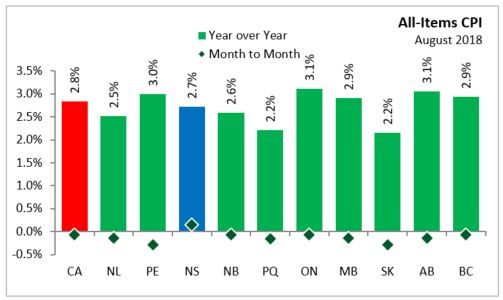
Nova Scotia's annual consumer price inflation (year over year growth in CPI) excluding food and energy rose 2.0 per cent in August, below the national rate of 2.3 per cent. Price level gains for this index were largest in BC (+2.8 per cent) and Ontario (+2.7 per cent) and lowest in Newfoundland and Labrador (+1.6 per cent). On a monthly basis, Nova Scotia's index excluding food and energy was up 0.2 per cent.
The main contributors to the monthly (August 2018 vs. July 2018) NS CPI movement:
Traveller Accommodation (+8.8%)
Clothing accessories, watches and jewellery (+4.5%)
Internet access services (-3.3%)
Fresh fruit (-7.5%)
The main contributors to the annual (August 2018 vs. August 2017) NS CPI movement:
Inter-city transportation (+25.8%)
Fuel oil and other fuels (+18.8%)
Recreational equipment and services (-7.9%)
Fresh or frozen chicken (-11.5%)
The CPI for food in Nova Scotia increased 0.5 per cent year-over-year with a 0.7 per cent increase month-over-month. CPI growth in food (year over year) was up in nine provinces, with only Saskatchewan reporting a decline. Nationally, annual food prices increased 1.6 per cent.
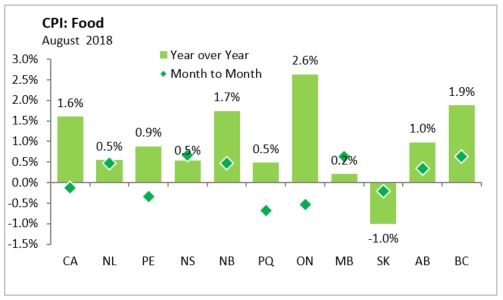
The Nova Scotia energy index increased by 11.9 per cent compared to a year ago. Energy price growth was smallest in BC (+8.2 per cent) on a year over year basis, and largest in Alberta (+19.2%). Nationally, the index was up 11.2 per cent.
Major Components for August 2018
The following table shows the price increases specific to Nova Scotia for the major components of the CPI this month:
Long Run Trends
The All-Items CPI year over year inflation rate for Nova Scotia was below Canada's in August 2018. Nova Scotia's annual inflation has remained below the Canadian average since mid-2014, with the exception of only a few months. While month to month movements in the indices can be different, over time they generally follow the same overall trend.
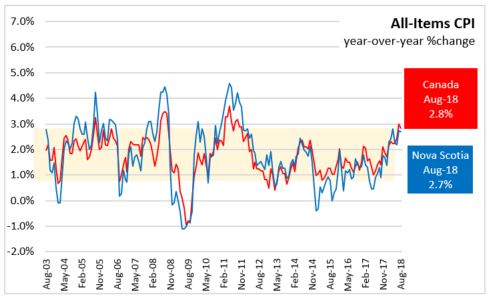
Annual inflation for the CPI excluding food and energy was lower for Nova Scotia (+2.0 per cent) than for Canada (+2.3 per cent) in August.
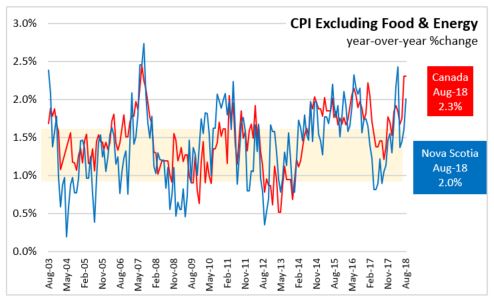
Bank of Canada's preferred measures of core inflation
Compared with August 2017, CPI-Trim rose 2.2 per cent, CPI-Median rose 2.1 per cent and CPI-Common rose 2.0 per cent in Canada. All-items CPI excluding eight of the most volatile components as defined by the Bank of Canada and excluding the effect of changes in indirect taxes (formerly referred to as CPIX) rose 1.7 per cent year over year in August 2018.
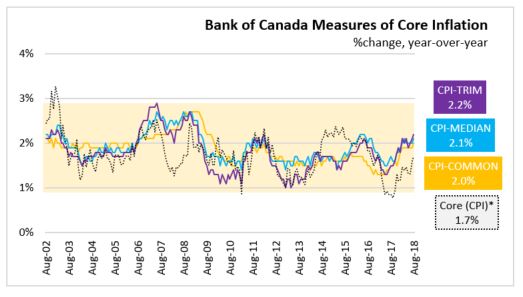
Appendix Tables and Charts

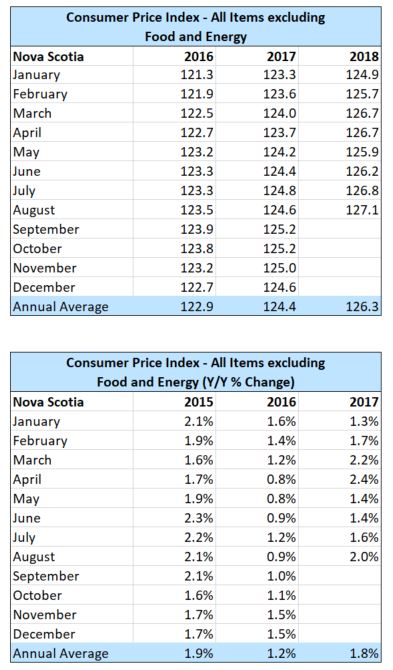
Source: Statistics Canada data portal: Tables 18-10-0004-01 and 18-10-0256-01